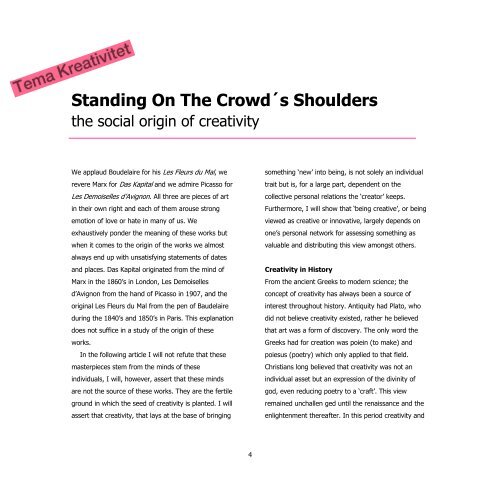Nr 15 Kreativitet: PDF-version - Populär Poesi
Nr 15 Kreativitet: PDF-version - Populär Poesi
Nr 15 Kreativitet: PDF-version - Populär Poesi
You also want an ePaper? Increase the reach of your titles
YUMPU automatically turns print PDFs into web optimized ePapers that Google loves.
Standing On The Crowd´s Shoulders<br />
the social origin of creativity<br />
We applaud Boudelaire for his Les Fleurs du Mal, we<br />
revere Marx for Das Kapital and we admire Picasso for<br />
Les Demoiselles d’Avignon. All three are pieces of art<br />
in their own right and each of them arouse strong<br />
emotion of love or hate in many of us. We<br />
exhaustively ponder the meaning of these works but<br />
when it comes to the origin of the works we almost<br />
always end up with unsatisfying statements of dates<br />
and places. Das Kapital originated from the mind of<br />
Marx in the 1860’s in London, Les Demoiselles<br />
d’Avignon from the hand of Picasso in 1907, and the<br />
original Les Fleurs du Mal from the pen of Baudelaire<br />
during the 1840’s and 1850’s in Paris. This explanation<br />
does not suffice in a study of the origin of these<br />
works.<br />
In the following article I will not refute that these<br />
masterpieces stem from the minds of these<br />
individuals, I will, however, assert that these minds<br />
are not the source of these works. They are the fertile<br />
ground in which the seed of creativity is planted. I will<br />
assert that creativity, that lays at the base of bringing<br />
4<br />
something ‘new’ into being, is not solely an individual<br />
trait but is, for a large part, dependent on the<br />
collective personal relations the ‘creator’ keeps.<br />
Furthermore, I will show that ‘being creative’, or being<br />
viewed as creative or innovative, largely depends on<br />
one’s personal network for assessing something as<br />
valuable and distributing this view amongst others.<br />
Creativity in History<br />
From the ancient Greeks to modern science; the<br />
concept of creativity has always been a source of<br />
interest throughout history. Antiquity had Plato, who<br />
did not believe creativity existed, rather he believed<br />
that art was a form of discovery. The only word the<br />
Greeks had for creation was poiein (to make) and<br />
poiesus (poetry) which only applied to that field.<br />
Christians long believed that creativity was not an<br />
individual asset but an expression of the divinity of<br />
god, even reducing poetry to a ‘craft’. This view<br />
remained unchallen ged until the renaissance and the<br />
enlightenment thereafter. In this period creativity and



